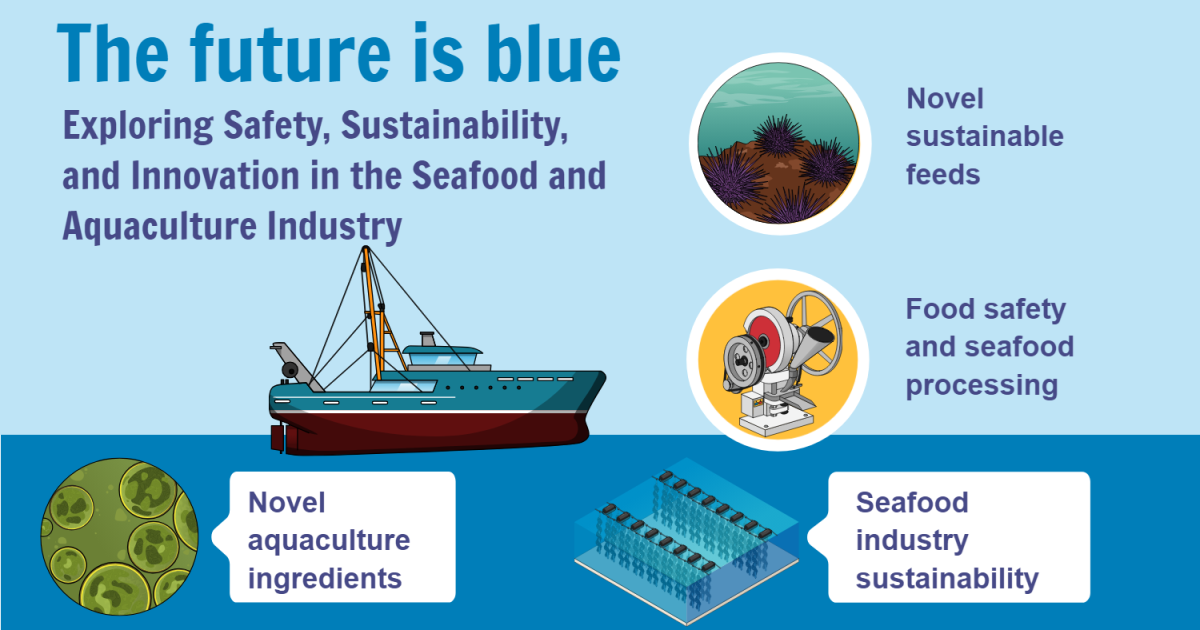The Future Is Blue: Exploring Safety, Sustainability, and Innovation in the Seafood and Aquaculture Industry
A special issue of Applied Sciences (ISSN 2076-3417). This special issue belongs to the section "Food Science and Technology".
Deadline for manuscript submissions: 20 February 2025 | Viewed by 3021

Special Issue Editors
Interests: microalgae and aquatic protist cultivation; new food product development; sustainable food systems; production of high-added-value molecules from food waste and by products; emerging food-processing technologies
Special Issue Information
Dear Colleagues,
The global landscape of food production and consumption is in a state of rapid transformation. As population growth and environmental challenges continue to mount, the focus is increasingly turning towards the sea. This Special Issue, "The Future is Blue: Exploring Safety, Sustainability, and Innovation in the Seafood and Aquaculture Industry," seeks to address this shift and highlight the innovative and sustainable practices emerging in the aquaculture and seafood industry.
We aim to curate a collection of cutting-edge research articles and thought leadership pieces that not only chart the course of the future of aquatic food production but also evaluate the sustainability of these practices through life cycle assessment (LCA) studies. Our goal is to explore innovative solutions that ensure the safety and quality of the seafood supply, enhance the sustainability of aquatic food systems, and contribute to food security and blue growth.
This Issue will delve into areas such as the development and utilization of novel food ingredients, including algae and other underexploited aquatic resources, in aquaculture feeds. We invite contributions addressing advancements in sustainable feed formulation and the impact these have on the environment, human health, and food safety.
Furthermore, we encourage submissions related to sustainable seafood processing techniques and technologies, and their role in reducing waste, enhancing product value, and ensuring food safety. Research regarding new processing methods, technological advancements, and value addition are particularly welcome.
We hope to provide a platform for researchers, practitioners, and policymakers to present and discuss innovative strategies and solutions in the seafood and aquaculture industry, illuminating the path for a future where the oceans continue to play a pivotal role in feeding the planet sustainably and safely.
In doing so, we aim to redefine our understanding of sustainable aquaculture practices and set the stage for new discussions and future research into how we can leverage the vast potential of our blue planet.
The future of our food systems is indeed blue, and this Special Issue seeks to explore this vital aspect of global food security, safety, and sustainability.
Dr. Giovanni Luca Russo
Dr. Antonio Luca Langellotti
Guest Editors
Manuscript Submission Information
Manuscripts should be submitted online at www.mdpi.com by registering and logging in to this website. Once you are registered, click here to go to the submission form. Manuscripts can be submitted until the deadline. All submissions that pass pre-check are peer-reviewed. Accepted papers will be published continuously in the journal (as soon as accepted) and will be listed together on the special issue website. Research articles, review articles as well as short communications are invited. For planned papers, a title and short abstract (about 100 words) can be sent to the Editorial Office for announcement on this website.
Submitted manuscripts should not have been published previously, nor be under consideration for publication elsewhere (except conference proceedings papers). All manuscripts are thoroughly refereed through a single-blind peer-review process. A guide for authors and other relevant information for submission of manuscripts is available on the Instructions for Authors page. Applied Sciences is an international peer-reviewed open access semimonthly journal published by MDPI.
Please visit the Instructions for Authors page before submitting a manuscript. The Article Processing Charge (APC) for publication in this open access journal is 2400 CHF (Swiss Francs). Submitted papers should be well formatted and use good English. Authors may use MDPI's English editing service prior to publication or during author revisions.
Keywords
- aquatic products
- aquaculture
- innovative technologies
- seafood quality
- food security
- food safety
- biotechnology
- nutraceuticals
- food processing
- feeds
Benefits of Publishing in a Special Issue
- Ease of navigation: Grouping papers by topic helps scholars navigate broad scope journals more efficiently.
- Greater discoverability: Special Issues support the reach and impact of scientific research. Articles in Special Issues are more discoverable and cited more frequently.
- Expansion of research network: Special Issues facilitate connections among authors, fostering scientific collaborations.
- External promotion: Articles in Special Issues are often promoted through the journal's social media, increasing their visibility.
- e-Book format: Special Issues with more than 10 articles can be published as dedicated e-books, ensuring wide and rapid dissemination.
Further information on MDPI's Special Issue polices can be found here.






